#Scanner Ca Foundation Books
Explore tagged Tumblr posts
Text
CA Foundation Exam : Do’s and Don’ts on Exam Day
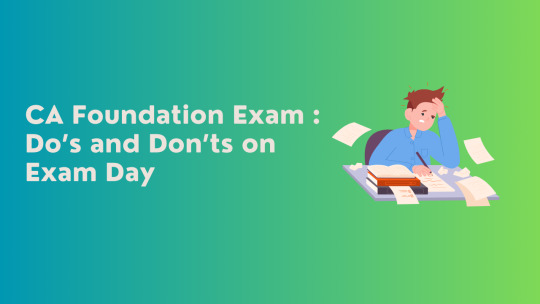
Though intense study and hard work are required to prepare for the CA Foundation exam, your performance on test day can be greatly impacted by your actions. This is a thorough tutorial on the must-do's and don'ts to guarantee exam success.
Do’s on Exam Day
1. Get a Good Night’s Sleep:
Ensure you get at least 7-8 hours of sleep before the exam day. A well-rested mind functions better, helping you recall information and think clearly during the exam.
2. Eat a Healthy Breakfast:
Start your day with a nutritious breakfast. Opt for foods that release energy slowly, like oats, whole grain cereals, and fruits. Avoid heavy or greasy foods that might make you sluggish.
3. Arrive Early:
Plan to arrive at the exam center at least 30 minutes early. This helps you avoid any last-minute stress caused by traffic or unforeseen delays.
4. Bring Necessary Materials:
Ensure you have all required materials, such as your admit card, ID proof, pens, pencils, erasers, and a calculator if allowed. Double-check the list of permitted items on the ICAI website.
5. Read Instructions Carefully:
Take a few minutes to read the instructions on the question paper. Understanding the instructions can help you avoid simple mistakes.
6. Time Management:
Allocate time for each section or question and stick to it. If you find yourself stuck on a difficult question, move on and come back to it if time permits.
7. Stay Calm and Focused:
Maintain your composure throughout the exam. If you feel anxious, take deep breaths and remind yourself that you have prepared well.
8. Review Your Answers:
If time allows, review your answers before submitting the paper. Look out for any missed questions or mistakes that can be corrected.
Don’ts on Exam Day
1. Don’t Cram:
Avoid last-minute cramming. It can increase anxiety and confusion. Trust the preparation you have done over the past months.
2. Don’t Skip Breakfast:
Skipping breakfast can lead to low energy levels and decreased concentration. Ensure you eat something to fuel your brain.
3. Don’t Bring Unauthorized Materials:
Check the list of prohibited items and ensure you don’t bring any unauthorized materials to the exam hall. This includes mobile phones, electronic devices, and study notes.
4. Don’t Panic Over Difficult Questions:
If you encounter a tough question, don’t panic. Move on to the next question and return to the difficult one later. Maintaining a positive mindset is crucial.
5. Don’t Rush Through the Paper:
While time management is important, rushing can lead to careless mistakes. Work at a steady pace, ensuring accuracy in your answers.
6. Don’t Discuss Answers During Breaks:
If there are breaks between papers, avoid discussing answers with fellow candidates. It can create unnecessary stress and self-doubt.
7. Don’t Ignore Instructions:
Not following instructions can lead to errors that might affect your score. Pay close attention to what’s asked and how you are required to respond.
8. Don’t Leave Early:
Even if you finish early, use the remaining time to review your answers. Leaving the exam hall early means you miss the opportunity to correct any mistakes.
Additional Tips
Preparing with the right materials can make a significant difference in your performance. Utilizing resources like Scanner CA Foundation Books, Scanner CA Final Books, and CA Foundation Scanner can help you practice efficiently and understand the exam pattern better. These resources provide a comprehensive collection of previous years’ questions and model answers, which are invaluable for your revision. Similarly, CA Intermediate Scanner and CA Final Scanner can aid in higher levels of preparation by offering detailed insights into exam trends and important topics.
In conclusion, your success in the CA Foundation exam is not just about how well you prepare but also about how well you manage yourself on the exam day. Follow these do’s and don’ts to maximize your performance and approach the exam with confidence. Good luck!
#study material for ca#scanner ca intermediate books#scanner ca foundation books#ca intermediate scanner#books for ca exam#ca entrance exam books
0 notes
Text
How I Managed CA Studies with a Full-Time Job
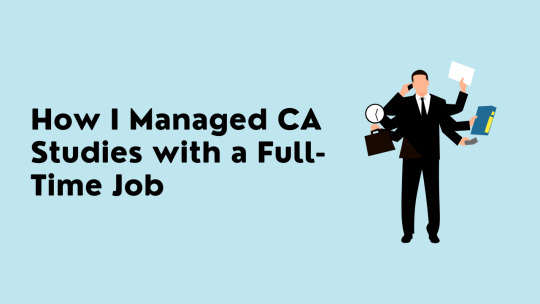
Pursuing the Chartered Accountancy (CA) qualification while holding down a full-time job is like juggling two demanding responsibilities simultaneously. Both require your undivided attention, leaving little room for error. However, with the right strategies, dedication, and mindset, it’s possible to excel in both areas. Utilizing the right CA Entrance Exam Books can make a significant difference in managing your study time effectively. Here’s how I managed to balance my CA studies with a full-time job and succeeded.
1. Setting Clear Goals
To successfully balance CA coursework with a full-time employment, you must first establish attainable goals. I started by outlining my path and establishing benchmarks for every CA course level. This roadmap helped me prioritize my studies and career by providing me with a clear understanding of what I needed to accomplish at each stage. To stay on track with my goals, I create daily, weekly, and monthly goals for my studies.
2. Time Management
Time management is the cornerstone of balancing work and studies. With a full-time job, my day was already packed, so I had to make the most of the time I had. I identified the most productive hours of my day and dedicated them to studying. For me, early mornings worked best. I would wake up at 5 AM, study for two hours using Scanner CA Foundation Books before heading to work, and then review my notes during my lunch break.
We set aside the weekends for longer, more focused study sessions. I dedicated several hours on Saturdays and Sundays to review and refine the knowledge I had acquired throughout the week, treating them as my "workdays" in CA. I was able to manage my time more wisely and give my work and studies the time and attention they required by making a thorough schedule.
3. Leveraging Technology
During this trip, technology became my best buddy. I made use of online tools to help me study while I was on the go, including e-books, study apps, and video lectures. I used the little minutes I had to myself—whether it was on my commute or at breaks—to review or watch a fast video course. Even on my busiest days, this strategy enabled me to remain engaged in my studies.
I also used productivity applications to keep track of my work and effectively manage my time. I found that using apps like Trello and Google Calendar helped me stay organized and make sure I finished my studies by the deadline.
4. Prioritizing and Sacrificing
Balancing CA studies and a full-time job required making some sacrifices. Social gatherings, leisure activities, and even sleep took a backseat as I prioritize my studies. I used resources like the CA Intermediate Scanner to streamline my preparation and maximize my efficiency. I learned to say "no" to distractions and focused on what mattered most—completing my CA qualification. While it wasn’t easy, I reminded myself that these sacrifices were temporary and would pay off in the long run.
But I also realized how crucial self-care is. I made careful to take quick pauses during study sessions and treat myself to tiny treats after achieving my study objectives because I knew that burning out would be detrimental. Keeping my work, studies, and personal health in check was essential to the long-term viability of my endeavors.
5. Seeking Support
Support from family, friends, and colleagues played a significant role in my journey. I told them about my objectives and difficulties, and they were incredibly supportive and sympathetic. Additionally, my company was understanding and gave me some leeway when I wanted to concentrate on my academics, particularly during exam season.
Connecting with other CA aspirants who were also managing work and studies helped me stay motivated. We shared tips, study materials for CA, and even vented about our struggles, which made the journey less isolating.
6. Staying Consistent and Resilient
My achievement was largely due to my consistency. I forced myself to study even on the days when I was tired after work since I knew that every little step would get me closer to my objective. Even though there were moments when the pressure seemed too much to bear, I persevered. I considered the goal of my journey—a fulfilling profession as a chartered accountant—and reminded myself of why I had set out on it.
In conclusion, managing CA studies with a full-time job is undoubtedly challenging, but it’s achievable with proper planning, time management, and unwavering determination. By setting clear goals, leveraging technology, making necessary sacrifices, seeking support, and staying consistent, I was able to successfully navigate this demanding journey. Utilizing tools like Scanner CA Final Books can be particularly helpful in your preparation. If you're on a similar path, remember that every effort you put in today will bring you closer to your goal tomorrow. Stay focused, and don’t give up!
#CA Entrance Exam Books#Scanner CA Foundation Books#CA intermediate scanner#Scanner CA Final Books#Study Material for CA
0 notes
Text
How to Stay Motivated Throughout Your CA Exam Journey

Embarking on the journey to become a Chartered Accountant (CA) is no small feat. It demands immense dedication, hard work, and resilience. Staying motivated throughout this journey can be challenging, but it is crucial for success. Utilizing resources like the CA Intermediate Scanner can significantly aid your preparation. Here are some effective strategies to help you maintain your motivation from the beginning to the end of your CA exam journey.
1. Set Clear Goals
Having clear, specific goals can provide a sense of direction and purpose. Break down your long-term goal of becoming a CA into smaller, manageable milestones. For instance, focus on passing individual exams, mastering specific subjects, or completing study modules. Celebrate each milestone you achieve, as this will give you a sense of accomplishment and keep you motivated to tackle the next one.
2. Develop a Study Plan
A well-structured study plan is essential for staying on track. Allocate specific times for studying, breaks, and revisions. Ensure that your study plan is realistic and includes time for relaxation and hobbies. By following a routine, you can avoid last-minute cramming and reduce stress. Stick to your plan as much as possible, but also be flexible enough to make adjustments when necessary.
3. Stay Organized
Keeping your study materials and notes organized can save you time and reduce frustration. Use folders, binders, or digital tools to categorize your study materials by subject or topic. A clutter-free study environment can help you focus better and enhance your productivity.
4. Find Your Study Style
Everyone has a unique study style that works best for them. Some people prefer studying alone, while others benefit from group study sessions. Experiment with different methods such as visual aids, flashcards, or practice tests to find what suits you best. Understanding your study style can make your study sessions more effective and enjoyable.
5. Take Care of Your Health
Maintaining good physical and mental health is vital for staying motivated. Ensure you get enough sleep, eat a balanced diet, and exercise regularly. Taking short breaks during study sessions can help refresh your mind. Practice mindfulness or meditation to manage stress and keep a positive mindset.
6. Seek Support
Having a support system can make a significant difference in your CA exam journey. Connect with fellow students, join study groups, or seek guidance from mentors or teachers. Sharing your experiences, discussing challenging topics, and getting moral support can boost your motivation and help you stay focused. Additionally, using resources like the CA Foundation Scanner can provide valuable practice and enhance your preparation.
7. Stay Positive
It is normal to encounter setbacks and challenges during your CA journey. Instead of getting discouraged, view these obstacles as learning opportunities. Stay positive and remind yourself why you started this journey. Visualize your success and the benefits of becoming a CA. Keeping a positive attitude can help you overcome difficulties and stay motivated.
8. Reward Yourself
Rewarding yourself for your hard work and achievements can be a great motivator. Treat yourself to something you -after completing a study session or passing an exam. It could be a movie, a meal at your favorite restaurant, or a short trip. Additionally, investing in helpful resources like Scanner CA Final Books can further boost your preparation. Rewards provide a sense of accomplishment and make the journey more enjoyable.
9. Stay Updated
Staying updated with the latest developments in the CA field can keep you motivated and informed. Follow industry news, attend seminars or webinars, and read relevant articles or blogs. Being aware of the opportunities and advancements in your field can reinforce your commitment to becoming a CA.
10. Reflect on Your Progress
Regularly take time to reflect on your progress. Assess what you have accomplished so far and identify areas that need improvement. Reflecting on your journey can provide insights into your strengths and weaknesses, helping you make necessary adjustments and stay motivated.
ConclusionStaying motivated throughout your CA exam journey is crucial for success. By setting clear goals, developing a study plan, staying organized, taking care of your health, seeking support, staying positive, rewarding yourself, staying updated, and reflecting on your progress, you can maintain your motivation and achieve your goal of becoming a Chartered Accountant. Incorporating resources like Scanner CA Foundation Books can help streamline your preparation and provide targeted practice. Remember, the journey may be challenging, but the rewards are well worth the effort. Keep pushing forward and believe in yourself!
#scanner ca intermediate books#scanner ca foundation books#scanner ca final books#ca foundation scanner#ca entrance exam books
0 notes
Text
How To Crack CA Foundation Exam in First Attempt

The Chartered Accountancy (CA) Foundation exam is a challenging milestone for aspiring accountants, but with the right strategy and dedication, it's possible to pass on your first attempt. Here’s a comprehensive guide to help you achieve this goal.
Understanding the CA Foundation Exam
The CA Foundation exam, conducted by the Institute of Chartered Accountants of India (ICAI), consists of four papers:
Principles and Practices of Accounting
Business Laws and Business Correspondence and Reporting
Business Mathematics, Logical Reasoning, and Statistics
Business Economics and Business and Commercial Knowledge
Each paper is designed to test your knowledge, analytical skills, and understanding of the subjects. The exam is held twice a year, in May and November.
Step-by-Step Guide to Crack the Exam
1. Understand the Syllabus and Exam Pattern
Before you begin your preparation, familiarize yourself with the syllabus and exam pattern. Knowing the weightage of each topic through CA Foundation Books helps in prioritizing your study plan. The CA Foundation exam includes both subjective and objective questions, with negative marking for the latter. Therefore, understanding the types of questions asked in the exam is crucial, and Books for CA Exam can provide you with the necessary insights. By studying the comprehensive understanding of the exam format and the kind of questions that are likely to be asked.
2. Create a Study Plan
A well-structured study plan is the backbone of your preparation. Allocate time for each subject based on its difficulty level and your proficiency. Here's a suggested timeline:
Month 1-2: Focus on understanding the basics of all subjects.
Month 3-4: Move to advanced concepts and start solving problems.
Month 5: Revision and practice with mock tests and previous years' papers.
Ensure you dedicate at least 6-8 hours daily for studies, with breaks in between to avoid burnout.
3. Use Quality Study Material For CA
Choosing the right study material can make a significant difference. Use Scanner Ca Foundation Books for study modules as your primary resource. Additionally, refer to other recommended books and online resources for different perspectives on difficult topics.
4. Take Notes and Summarize
Taking notes while studying helps in retaining information better. Summarize each chapter in your own words, focusing on key concepts and formulas. These notes will be invaluable during revision.
5. Practice Regularly
Practice is the key to success in the CA Foundation exam. Solve as many problems as you can from different sources. Practice papers, mock tests, and previous years' question papers should be part of your daily routine. This not only helps in understanding the exam pattern but also in managing time effectively during the exam.
6. Focus on Weak Areas
Identify your weak areas early in your preparation. Spend extra time strengthening these topics. Don’t hesitate to seek help from teachers, online forums, or study groups if you’re struggling with certain concepts.
7. Stay Motivated
Preparation for CA Foundation can be a long and stressful journey. Stay motivated by setting small goals and rewarding yourself upon achieving them. Join study groups for support and encouragement from peers.
Conclusion
Cracking the CA Foundation exam on the first attempt requires dedication, strategic planning, and consistent effort. By understanding the syllabus, following a structured study plan, using quality resources, and maintaining a balanced lifestyle, you can increase your chances of success. Remember, persistence and a positive attitude go a long way. Stay focused, and you will achieve your goal. Good luck!
#CA Foundation Books#Scanner Ca Foundation Books#Study Material For Ca#Books For Ca Exam#Study Material For Ca Foundation Books
0 notes
Text
Optimizing Your Study Plan: Revised CA Intermediate Exam Dates for May 2024
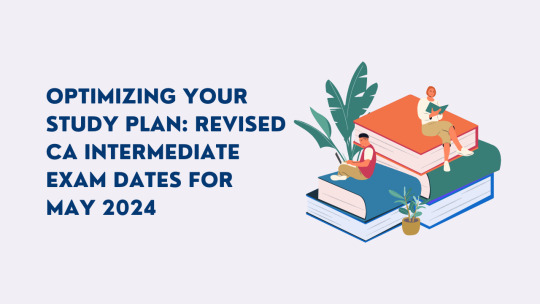
Introduction
In the realm of academic pursuits, aspiring chartered accountants eagerly await the unveiling of examination schedules, as these dates dictate the rhythm of their study routines. With the Revised CA Intermediate Exam Dates for May 2024 now available, it's paramount for candidates to recalibrate their study plans to align with these newly disclosed timelines. Here, we delve into the intricacies of the revised schedule, offering insights and strategies to optimize your preparation for success. Leveraging resources like CA Intermediate Books can significantly enhance your study regimen, providing comprehensive coverage of the syllabus and invaluable practice opportunities to bolster your confidence and readiness for the exams.
Understanding the Revised Schedule
The Revised CA Intermediate Exam Dates for May 2024 signify a pivotal moment for candidates embarking on their journey towards achieving CA certification. The revised timetable, meticulously crafted to accommodate various logistical considerations and unforeseen circumstances, outlines the timeline for the intermediate-level examinations. As a CA aspirant, comprehending the nuances of this revised schedule is indispensable for formulating a comprehensive study plan.
Strategic Study Approaches
Leveraging Additional Preparation Time
One of the primary advantages afforded by the revised exam dates is the extension of preparation time. This extension provides candidates with a valuable opportunity to delve deeper into intricate concepts, reinforce foundational knowledge, and engage in rigorous practice sessions. By capitalizing on this additional time, candidates can cultivate a more profound understanding of the subject matter, thereby enhancing their preparedness for the examinations. Utilizing resources such as ScannerCA Foundation Books can be particularly beneficial during this extended preparation period.
Adopting a Structured Study Plan
A structured study plan serves as the cornerstone of effective exam preparation. With the revised CA Intermediate Exam Dates delineating the timeline for the impending assessments, candidates must devise a meticulously structured study plan tailored to their individual learning styles and preferences. This plan should encompass dedicated study sessions, periodic revisions, and simulated mock tests to simulate exam conditions and fortify conceptual understanding.
Embracing Resource Diversification
Diversification of study resources is essential for cultivating a comprehensive understanding of the curriculum. Beyond conventional textbooks and lecture notes, candidates should explore supplementary learning materials such as online tutorials, instructional videos, and reference guides. Embracing diverse resources enriches the learning experience, offering alternative perspectives and elucidating complex concepts through varied mediums.
Navigating Challenges Effectively
Overcoming Procrastination
Procrastination poses a significant impediment to effective exam preparation, often derailing study plans and impeding progress. To overcome this challenge, candidates must cultivate a disciplined approach to time management, setting realistic study goals and adhering to predetermined study schedules. Additionally, adopting strategies such as the Pomodoro Technique, which involves alternating periods of focused study with brief breaks, can mitigate the temptation to procrastinate and enhance productivity.
Managing Exam Anxiety
Exam anxiety, characterized by feelings of apprehension and unease preceding assessments, can undermine performance and impede concentration. To manage exam anxiety effectively, candidates should implement relaxation techniques such as deep breathing exercises, mindfulness meditation, and progressive muscle relaxation. Moreover, fostering a positive mindset, reframing challenges as opportunities for growth, and visualizing success can bolster confidence and alleviate anxiety.
Conclusion
The Revised CA Intermediate Exam Dates for May 2024 herald a new chapter in the journey of CA aspirants, providing an opportunity to recalibrate study plans and optimize preparation strategies. By leveraging additional preparation time and incorporating resources like CA Final Books, and also CA candidates can adopt CA Foundation Books for study approaches and navigate challenges effectively. This enables them to embark on their CA entrance exam journey with confidence and determination. It's essential to remember that success in the CA Intermediate examinations hinges not only on diligence and perseverance but also on strategic planning and resource utilization.
0 notes
Text
1 note
·
View note
Text
Ca Entrance Exam Books | CUET Books | CS | CMA | Scanneradda
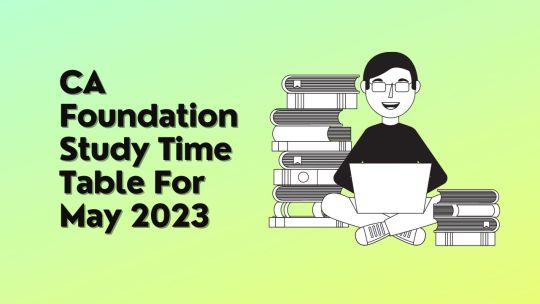
CA Foundation Study Time Table For May 2023
You should have a schedule for your CA Foundation studies that includes daily, weekly, and monthly study schedules. Ensure that the study schedule includes portions for the CA Exams Test Series. The CA Foundation test is a requirement for the Chartered Accountancy Course. The exam is the first requirement for becoming a chartered accountant. Currently, passing the Foundation exam is challenging due to the low passing marks and negative marks. Students need to establish a plan for their study time if they want to ace the Foundation exam in the first attempt and also they need to study from one of the best ca foundation books for the best results.
The student who is preparing for CA Foundation benefits from setting specific, well-defined learning objectives. As a result, you should plan your free time as a student in order to give your studies your complete attention.
When preparing for the CA Foundation Course, it is important to analyse and reorganise the syllabus, assign specific time slots to each subject, and plan study sessions in advance. Additionally, taking practice tests can give candidates an insight into how well they are prepared for their upcoming exam. Lastly, allocating sufficient time for revising is critical in order to understand major topics before moving on.
CA Foundation self-study strategy
One can better learn a subject by employing examples that are relevant to him or her personally rather than relying on the lecturer's detailed examples. Create your own self-study schedule and learn at your own pace. Courses are taught at teaching centres at the usual pace, notwithstanding the fact that pupils learn at different rates.
You are not obligated to follow anyone else's schedule or constraints when creating your own self-study timetable for CA Foundation. You can study that subject whenever you choose, without anyone's permission.
Create a customised Study Schedule
A customised study schedule for a CA Foundation student should take into consideration the following factors:
Study pace: Set a realistic pace of studying, taking into account your current workload, level of understanding and how much time you can realistically commit to studying.
Exam date: Plan your study schedule around the date of the CA Foundation exam, making sure you have enough time to cover all the subjects.
Weaknesses: Identify the subjects you struggle with the most and allocate more time for them in your study schedule.
Study resources: Make use of study material from various sources, including best ca entrance exam book, online resources, and past papers.
Breaks and revision: Include regular breaks and time for revision in your study schedule to avoid burnout and consolidate your learning.
Example study schedule:
Day 1-2: 4 hours per day for Economics and Business Studies
Day 3-4: 4 hours per day for Business Laws
Day 5: Revision of Economics and Business Studies
Day 6: Revision of Business Laws
Day 7: Take a break
Day 8-9: 4 hours per day for Accounting
Day 10-11: 4 hours per day for Mathematics and Statistics
Day 12: Revision of Accounting
Day 13: Revision of Mathematics and Statistics
Day 14: Take a break
While making a study timetable, the following things should be focused on:
Goals: Set specific, achievable study goals for each subject, with a focus on areas where you struggle the most.
Time management: Allocate sufficient time for each subject along with allocating time for breaks and revision.
Prioritisation: Prioritise subjects based on their weightage and level of difficulty, allocating more time to the subjects you struggle with the most.
Study methods: Consider different study methods, such as active learning (e.g. practice questions, summarising), and alternate between these methods to keep things interesting.
Realism: Make sure the study schedule is realistic and takes into account any other commitments you may have, such as work or family responsibilities.
Flexibility: Be flexible and adjust the study schedule as needed, based on your progress and level of understanding.
Breaks: Regularly schedule breaks and time for relaxation, to avoid burnout and ensure you are able to maintain focus over the long term.
Guidelines for 1 month study plan for CA Foundation:
Mathematics:
Identify the specific topic you need to study.
Review the basics and essential formulas for the topic.
Allocate time for studying, e.g. 2 hours a day, 5 days a week.
Create a study schedule, breaking down the topic into smaller, manageable sections.
Use different resources, such as textbooks, online tutorials, and practice problems to deepen your understanding.
Solve practice problems regularly to test your understanding and identify areas that need improvement.
Economics:
Start by reviewing the basic principles of economics.
Set a study schedule, allocating time each day or each week to economics.
Practice applying economic concepts by solving problem sets, participating in case studies, or working on projects.
Stay up to date with current economic events and analyse how they relate to the principles studied.
Make flashcards or summarise key concepts and theories in your own words to improve retention.
Consider finding a study group or a tutor to discuss economics with and to receive additional support.
Law:
Allocate specific time slots for studying each subject, taking breaks, and reviewing what you have learned.
Practise active learning techniques such as summarising, asking questions, and explaining the information to someone else.
Join a study group or connect with classmates to discuss and review material, ask questions, and receive feedback.
Apply what you have learned by doing practice questions, writing essays, or taking mock exams.
Keep track of important dates, deadlines, and notes in a planner or an app to stay on top of your studies.
Accounts:
Start with the basics: Ensure that you have a solid understanding of fundamental accounting concepts and principles.
Make a study schedule: Dedicate specific time slots for studying each topic, taking breaks, and reviewing what you have learned.
Use a variety of resources: Utilise textbooks, lecture notes, online tutorials, and practice problems to deepen your understanding.
Practice regularly: Complete practice problems, take mock exams, or work through real-life case studies to apply what you have learned.
Focus on areas of weakness: Identify the areas where you struggle the most and dedicate extra time to studying those topics.
Collaborate with others: Join a study group or connect with friends to discuss and review material, ask questions, and receive feedback.
Stay organised: Keep track of important dates, deadlines, and notes in a planner or an app to stay on top of your studies.
Take breaks: Regular breaks help to refresh your mind and prevent burnout. Take breaks to relax, exercise, or meditate.
Stay up-to-date: Stay informed of recent developments and changes in accounting to maintain a broad perspective and improve your problem-solving skills.
CA Foundation Study Plan for 3 months:
Here's a high-level 3-month study plan for CA Foundation:
Month 1:
Start with the basics of Accounting, Business Laws, and General Economics.
Make brief notes for each subject and revise regularly.
Take mock tests and analyse your strengths and weaknesses.
Month 2:
Focus on strengthening your weak areas and revise all subjects thoroughly.
Start practising problems and take more mock tests.
Give special attention to Accounting, it carries the maximum marks.
Month 3:
Revise all subjects one final time and focus on your weak areas.
Take as many mock tests as possible to build your confidence.
Get clarification on any doubts you have before the final exams.
Conclusion:
Creating a study timetable and following a regular schedule when preparing for the CA Foundation Exam in May is essential. Allocating time to each subject, getting familiar with question types, attending tuition classes, discussing difficult concepts with experienced accountants, studying from some of the best ca entrance exam books and taking practice tests online or through books can help improve chances of success in the exam. Utilising all these resources combined with hard work and dedication will ensure your success.
#cafoundationbooks#CA Entrance Exam Books#CA Foundation Book#CA Intermediate Books#CA Final Books#ca foundation scanner#books of ca foundation
0 notes
Text
How to Choose the Right CA Firm for Articleship
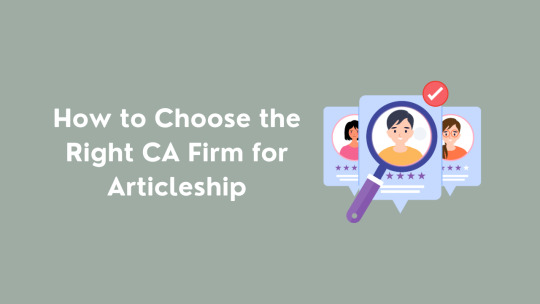
Choosing the right Chartered Accountant (CA) firm for your articleship is a pivotal step in your CA journey. The experience you gain during this period will shape your skills, knowledge, and career trajectory. With numerous options available, making the best choice can be daunting. Here's a comprehensive guide to help you select the right CA firm for your articleship, tailored to your goals and aspirations.
1. Understand Your Career Goals
Before diving into options, clarify your career objectives. Are you inclined toward auditing, taxation, finance, or consultancy? Your interests and long-term goals should guide your decision, as the type of work exposure you receive during articleship plays a crucial role in your career development.
2. Types of CA Firms
CA firms vary significantly in size, scope, and specialization. Understanding the differences will help you decide which type suits you best:
Big 4 Firms: Deloitte, PwC, EY, and KPMG offer exposure to large-scale audits, multinational clients, and specialized fields. These firms are ideal if you aim for a corporate career.
Mid-Sized Firms: These firms often provide a balance between work exposure and learning. They handle diverse clients and allow you to work in multiple domains.
Small Firms: These are perfect for students who prefer hands-on experience and close mentorship. You’ll likely handle end-to-end processes, gaining in-depth knowledge of various aspects of accounting and taxation.
3. Research Firm Profiles
Once you shortlist firms, research their profiles in detail. Look into:
Their client base and industry sectors.
The type of work they handle (audits, taxation, advisory, etc.).
Opportunities for international assignments.
Reviews from previous articleship trainees.
4. Location Matters
The firm’s location is another critical factor. If you’re preparing for exams using resources like CA Entrance Exam Books, Scanner CA Foundation Books, and Scanner CA Intermediate Books, being close to your classes or library can save time and energy. Additionally, consider living expenses and commuting time when evaluating a firm's location.
5. Work-Life Balance
Some firms demand long working hours, which can affect your exam preparation. Balance is key, especially if you’re using tools like CA Foundation Scanner, CA Intermediate Scanner, or CA Final Scanner to study. Ensure the firm’s workload allows you sufficient time for self-study and exam preparation.
6. Interview the Firm
During your interview, ask relevant questions to gauge whether the firm aligns with your expectations. Here are a few to consider:
What kind of work will I be exposed to?
Are there opportunities for rotation across departments?
How many other articles are currently employed?
What is the firm’s policy on exam leaves?
7. Focus on Learning Opportunities
The primary purpose of articleship is to gain practical knowledge. A firm that provides exposure to diverse domains like auditing, taxation, GST compliance, and financial reporting will prepare you for real-world challenges.
8. Evaluate the Mentorship
Working under a skilled and supportive mentor is invaluable. A good mentor will not only guide you through technical challenges but also provide career advice and motivation. Choose a firm where you’ll have access to experienced professionals who are willing to invest in your growth.
9. Consider Stipend and Perks
While the stipend shouldn’t be your primary criterion, it’s worth considering. Some firms also offer perks like reimbursements for study materials, including Scanner CA Final Books, or access to learning platforms.
10. Peer Environment
The work culture and peer environment can significantly impact your experience. A firm with a supportive and collaborative atmosphere will make your articleship more enjoyable and productive.
11. Align with Your Exam Preparation
Your articleship should complement your exam preparation. If you’re preparing with resources like Scanner CA Foundation Books, Scanner CA Intermediate Books, or CA Final Scanner, choose a firm that provides sufficient exam leaves and supports your academic commitments.
12. Networking Opportunities
Articleship is an excellent time to build your professional network. Working in a firm with diverse clients and connections can open doors to future opportunities.
13. Feedback from Seniors
Speak to seniors who have completed their articleship in the firms you’re considering. They can provide insights into the firm’s work culture, learning opportunities, and challenges.
14. Long-Term Benefits
Think about how the firm will benefit you in the long run. A well-known firm with a strong reputation can enhance your resume and provide better career opportunities post-qualification.
Conclusion
Choosing the right CA firm for your articleship is a critical decision that can shape your career. Consider factors like your career goals, the type of work exposure, location, mentorship, and exam preparation support. Balance your articleship with the help of resources like CA Foundation Scanner, CA Intermediate Scanner, and Scanner CA Final Books to ensure a smooth journey.
By selecting a firm that aligns with your aspirations, you can gain valuable experience, enhance your skills, and set the foundation for a successful CA career.
0 notes
Text
10 Effective Networking Strategies in the CA Industry

The most important aspect of every career path is networking, particularly in the field of chartered accounting (CA). Building strong relationships can lead to industry insights, mentorship, and job prospects. These practical networking techniques, which emphasize the value of resources, are geared toward prospective and practicing certified accountants.
1. Engage in Professional Associations and Groups
It can be quite advantageous to join local CA organizations and professional groups such as the Institute of Chartered Accountants of India (ICAI). These platforms provide opportunities for networking with peers and seasoned professionals through seminars, workshops, and networking events. Participating actively in these associations can help you make important connections and keep you informed about trends in the industry.
2. Leverage Social Media and Online Forums
Networking is facilitated well by social media sites like LinkedIn, Twitter, and niche discussion boards like CA clubindia. Engage in conversations on a regular basis, impart knowledge, and establish connections with business titans. Additionally, online study groups focused on CA Foundation Books, provide a space for collaborative learning and networking with fellow aspirants.
3. Attend Industry Conferences and Seminars
Industry conferences and seminars are excellent venues for networking with experts from different CA industry sectors. Expert speakers and panel discussions are frequently featured at these gatherings, offering insights into prevailing issues and trends. Bringing along Books for CA Exam can be an excellent conversation starter, showing your dedication and preparedness.
4. Participate in Workshops and Training Programs
Workshops and training courses provide opportunities for practical learning as well as networking with mentors and peers. Look for sessions that focus on practical skills and knowledge areas covered in your Study Material for CA. These settings foster close-knit networking as participants share a common goal of skill enhancement.
5. Utilize Alumni Networks
The community of former students at your university might be a very useful tool. Speak with former students who choose to work in California. They may also be able to expose you to their professional networks and provide advice and mentoring. Discussing shared experiences, such as preparing for exams with CA Entrance Exam Books, can help build a strong connection.
6. Engage in Study Groups
Forming or joining study groups for exam preparation can be a dual-benefit activity. Not only does it help in mastering the content from Books and CA Intermediate Scanner, but it also provides a platform to build relationships with fellow aspirants. These peers can become future colleagues or industry contacts.
7. Seek Mentorship
Your ability to advance professionally in the CA field might be greatly impacted by finding a mentor. Mentors offer helpful guidance, encouragement, and connections to their professional network. When requesting mentorship, show your dedication by going over particular subjects from your CA course content and how they connect to your desired professional path.
8. Volunteer for Professional Projects
Participating in volunteer work at conferences or professional associations might help you get more recognition and showcase your abilities. It's a great way to build your professional network and put the knowledge from the CA and other exam materials to use in practical situations.
9. Engage in Continuous Learning
The laws and procedures governing the CA industry are always changing, making it a dynamic sector. Keep yourself ahead of the curve by taking advanced classes, attending workshops, and reading current CA Entrance Books and other pertinent Study Materials. By posting your thoughts and learnings on social media sites like LinkedIn, you can expand your professional network by attracting like-minded individuals.
10. Follow Up and Maintain Relationships
Networking involves not only establishing new connections but also fostering and preserving existing ones. Send thank-you messages, follow up with folks you met at events, and stay in touch on a regular basis.
Conclusion
In the Chartered Accountant (CA) field, networking success is mostly dependent on developing sincere connections, going to business gatherings, utilizing social media, and joining associations for professionals. CAs can keep informed about industry developments, expand their professional knowledge, and create new possibilities by actively interacting with peers and mentors. In the fast-paced world of accounting, these tactics not only support professional development but also cultivate the kind of teamwork that is necessary for both individual and professional success.
#ca final books#study material for ca#books for ca exam#ca foundation books#ca intermediate books#ca entrance exam books
0 notes
Text
Books For CA Foundation June 2024 Exam
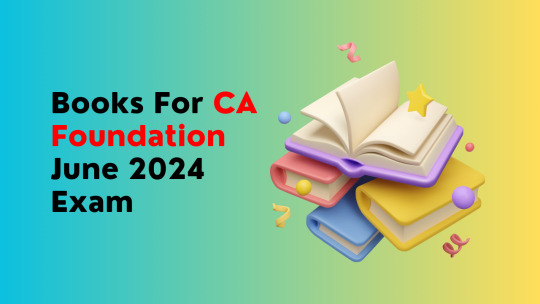
In June 2024, the CA Foundation exam will challenge aspiring Chartered Accountants with a comprehensive assessment covering Accounting, Business Laws, Quantitative Aptitude, and Business Economics. This exam serves as a pivotal milestone in their journey towards professional certification. Candidates must demonstrate proficiency in understanding core concepts, applying knowledge to real-world scenarios, and staying updated with current regulations. Success demands diligent preparation, strategic study techniques, and a thorough grasp of the exam syllabus.
Books for students attempting the CA Foundation Exam June 2024
For students preparing for the CA Foundation exam in June 2024, comprehensive study materials covering all subjects is essential. Opt for CA Foundation books specifically tailored to the CA Foundation syllabus, authored by reputable professionals or institutes. Additionally, solve previous years' question papers and practice mock tests to familiarize yourself with the exam pattern and improve time management skills. Utilize supplementary materials like revision guides and concise notes to reinforce key concepts. Ensure the books are up-to-date with the latest amendments and revisions in relevant laws and regulations. Effective time management and focused study are crucial for success.
Here is the list of best CA Foundation books that students can choose to get the best results in their CA Foundation Exam:
Paper-1: Accounting
Features
Scanner Green Edition CA Foundation Paper 1 Accounting
Solutions as per Schedule III of Companies Act, 2013 and Revised Accounting Standards
Analytical classification of every chapter
Contents establishing correlation between study material and chapter in Scanner
Complete Syllabus
Complete Questions with Solutions
For June 2024 Exam Onwards
Including questions and solutions of June 2023
As per latest updated syllabus of ICAI
Free app for MCQ’s & support
Author: CA Amar Omar, CA Rasika Goenka, CA Nishant Kumar
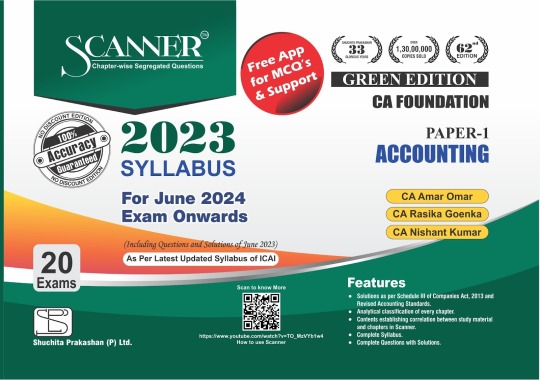
Paper 2: Business Laws
Features
Scanner Green Edition CA Foundation Paper 2 Business Laws
Solutions as per Schedule III of Companies Act, 2013 and Revised Accounting Standards
Analytical classification of every chapter
Contents establishing correlation between study material and chapter in Scanner
Complete Syllabus
Complete Questions with Solutions
For June 2024 Exam Onwards
Including questions and solutions of June 2023
As per latest updated syllabus of ICAI
Free app for MCQ’s & support
Author: CA Amar Omar, CA Rasika Goenka
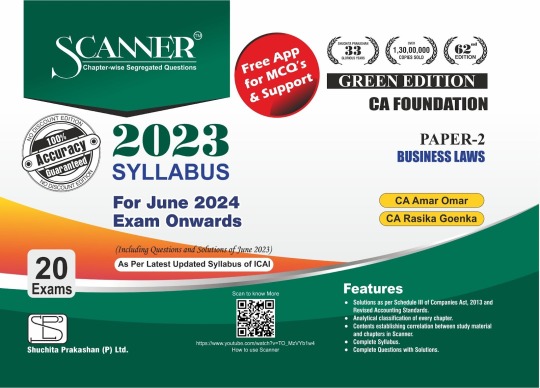
Paper 3: Quantitative Aptitude
Features
Scanner Green Edition CA Foundation Paper 2 Business Laws
Solutions as per Schedule III of Companies Act, 2013 and Revised Accounting Standards
Analytical classification of every chapter
Contents establishing correlation between study material and chapter in Scanner
Complete Syllabus
Complete Questions with Solutions
For June 2024 Exam Onwards
Including questions and solutions of June 2024
As per latest updated syllabus of ICAI
Author: CA Amar Omar, CA Rasika Goenka, CA Nishnat Kumar
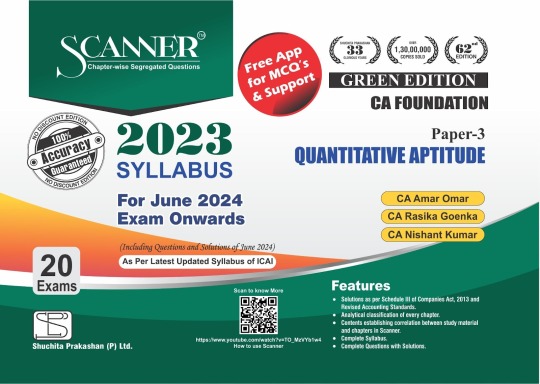
Paper 4: Business Economics
Features
Scanner Green Edition CA Foundation Paper 2 Business Laws
Solutions as per Schedule III of Companies Act, 2013 and Revised Accounting Standards
Analytical classification of every chapter
Contents establishing correlation between study material and chapter in Scanner
Complete Syllabus
Complete Questions with Solutions
For June 2024 Exam Onwards
Including questions and solutions of June 2024
As per latest updated syllabus of ICAI
Author: CA Amar Omar, CA Rasika Goenka
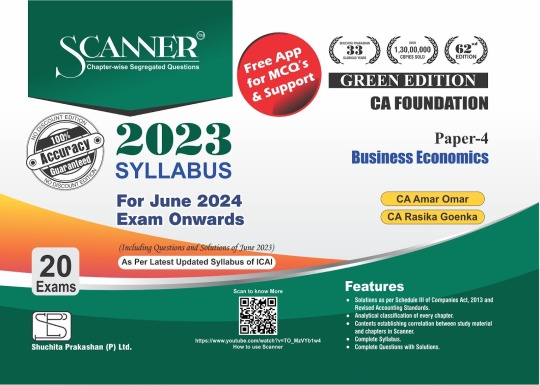
Conclusion
As students prepare for the CA Foundation exam in June 2024, the importance of choosing the appropriate ca foundation study materials cannot be overstated. Opt for textbooks specifically designed to align with the syllabus. Focus on comprehension rather than mere memorization, and allocate sufficient time to practicing with mock tests and previous exam papers. Embrace a well-rounded study strategy and remain abreast of any regulatory updates. With this approach, candidates can approach the exam confidently and set themselves on the path to success in the rigorous realm of Chartered Accountancy.
0 notes
Text
How To Choose The Right CA Intermediate Books for Your Exam

Choosing the right books for CA Intermediate exams is crucial for effective preparation and success. The abundance of study material can be overwhelming, but selecting the right resources can make your study process more streamlined and efficient. Here are some key considerations to help you choose the best CA Intermediate books for your exam preparation:
1. Understand the Syllabus
Before selecting any CA Final Books, make sure you have a thorough understanding of the CA Intermediate syllabus. The Institute of Chartered Accountants of India (ICAI) provides a detailed syllabus and study material for CA . Use this as a benchmark to assess the comprehensiveness of the books you are considering. Ensure that the books cover all the topics and sub-topics mentioned in the syllabus.
2. Refer to ICAI Study Material
The ICAI study material is the most authoritative source of content for CA exams. It is curated by experts and aligns perfectly with the exam pattern and syllabus. Start with the ICAI study material and practice manuals, as these provide a solid foundation and are often the basis for exam questions. Additionally, incorporating the CA Foundation books into your study routine can be highly beneficial. The CA Foundation Scanner includes previous exam questions and model answers, helping you understand the type of questions asked and the ideal way to answer them, further enhancing your exam preparation.
3. Author's Expertise and Reputation
Evaluating an author's expertise and reputation is crucial when selecting CA Entrance Exam Books. Quality resources authored by seasoned professionals ensure accurate information and effective study strategies, aiding success in the rigorous CA entrance examination.
4. Review and Recommendations
To find the best Books for CA Exam preparation, seek recommendations from seniors, mentors, or CA professionals who have successfully cleared the CA Intermediate exams. Online forums, social media groups, and educational platforms often have discussions where students share their experiences and suggest the best books for exam preparation. Reading reviews on platforms like Amazon or Goodreads can also give you insights into the quality and usability of the books.
5. Latest Edition
Always opt for the latest edition of the books. The CA syllabus and exam patterns are subject to changes and updates, and the latest editions are more likely to include the most recent amendments, case studies, and practice questions. Using outdated books can lead to missing out on important changes.
6. Clarity and Comprehensiveness
Choose books that are well-structured, clear, and comprehensive. The language should be easy to understand, and the concepts should be explained in a straightforward manner. Books with good illustrations, examples, and case studies can help in better comprehension of complex topics. Look for books that offer a balance between theory and practical problems.
7. Practice Questions and Mock Tests
Practice is key to success in CA exams. Select books that include a plethora of practice questions, past exam papers, and mock tests. Books that offer a variety of problems, from basic to advanced levels, will help you build your problem-solving skills and time management. Make sure the books provide detailed solutions and explanations for the practice questions.
8. Supplementary Resources
Take into account supplemental materials such as reference books, study aids, and summary notes in addition to traditional textbooks. These can be very helpful for last-minute planning and rapid adjustments. Online materials, like video lectures, are sometimes included with books, which can help you comprehend the material even more.
9. Personal Preference and Learning Style
Finally, think about your personal preferences and learning style. While some students could benefit more from publications that incorporate diagrams and flowcharts, others may prefer thorough, text-heavy literature. It's critical to select books that complement your study style and that you find interesting.
Conclusion
Choosing the appropriate CA books for you is a strategic and personal choice that will have a big impact on how well you prepare for the test. You can create a strong study plan by taking into account the curriculum, consulting ICAI materials, selecting reputable writers, and making sure everything is clear and thorough. Recall that the objective is to fully comprehend the ideas and practice a lot. You will be prepared to take the CA Intermediate examinations with confidence if you have the appropriate materials at your disposal.
#ca entrance exam books#study material for ca#scanner ca foundation books#books for ca exam#scanner ca intermediate books#ca intermediate scanner
0 notes
Text
Exploring the Benefits of Pursuing a CA Qualification
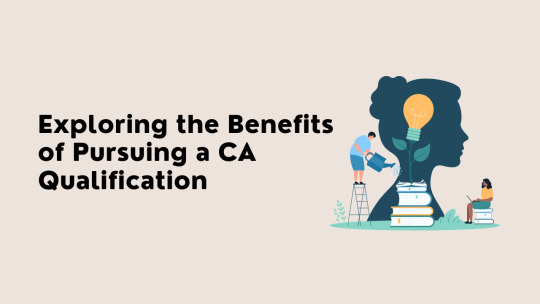
The Chartered Accountancy (CA) qualification is one of the most prestigious and sought-after credentials in the field of accounting and finance. Pursuing a CA qualification is a challenging yet rewarding journey that opens up a world of opportunities for those who are passionate about numbers, financial management, and business strategy. To succeed in this journey, choosing the right books for the CA exam is crucial, as they play a significant role in understanding complex concepts and acing the exams. In this blog, we will explore the numerous benefits of earning a CA qualification.
1. High Demand and Global Recognition
One of the most significant benefits of becoming a CA is the global recognition and respect the qualification commands. CAs are highly valued for their expertise in financial management, auditing, taxation, and strategic financial planning. The CA qualification is recognized in many countries, making it easier for professionals to work internationally. Whether you choose to work in public practice, corporate finance, or as an independent consultant, the CA credential provides a competitive edge in the job market. To excel in the CA Final exams, many aspirin CAs rely on resources like scanner CA Final books, which offer a thorough review of past exam questions and solutions, helping them prepare effectively for the challenges ahead.
2. Diverse Career Opportunities
Gaining a CA qualification makes it possible to pursue a variety of professional paths in numerous industries. CAs can have leadership positions in strategy, management, and finance in addition to typical accounting jobs. Key positions that CAs can seek include the following:
Auditor: Ensuring the accuracy of financial statements and compliance with regulatory standards.
Tax Consultant: Advising individuals and businesses on tax planning, compliance, and optimization.
Financial Analyst: Analyzing financial data to guide investment decisions and corporate strategy.
Chief Financial Officer (CFO): Leading the financial operations of an organization and driving its financial strategy.
Business Advisor: Providing strategic advice to businesses on growth, risk management, and financial planning.
Professionals can transition between different industries and professions as a result of the CA qualification's adaptability, which makes it a dynamic and flexible career path.
3. Strong Earning Potential
The earning potential for CAs is outstanding, with competitive salary and the potential for significant financial advantages. The earning potential of a chartered accountant increases dramatically with experience and promotion into more senior positions. Because of their combination of specialized skills, widespread reputation, and high demand, chartered accountants (CAs) typically command more salary than other professionals in the accounting and financial domain. For aspiring CAs, using resources like the CA Foundation Scanner can be invaluable in preparing for exams, ensuring a strong foundation that sets the stage for future success and higher earning potential.
4. Professional Growth and Continuous Learning
Achieving the CA qualification requires a commitment to ongoing professional growth rather than just passing exams. The world of accounting and finance is always changing, and certified public accountants (CAs) must keep up with the newest rules, practices, and trends in the field. Because of their dedication to lifelong learning, CAs are able to maintain their leadership positions in their fields and provide significant benefits to their employers.
5. Job Security and Stability
In an ever-changing economic environment, job security is a significant consideration for many professionals. The CA qualification provides a high level of job security due to the essential nature of accounting and financial management in all businesses. Regardless of economic conditions, organizations will always need skilled professionals to manage their finances, audit their books, and ensure compliance with regulations. Additionally, the availability of comprehensive study material for CA candidates ensures that aspiring professionals are well-prepared to meet these demands, further solidifying their job security in the field.
6. Entrepreneurial Opportunities
For those with an entrepreneurial spirit, a CA qualification can be a stepping stone to starting your own practice or business. The financial acumen, strategic thinking, and business knowledge gained during the CA journey equip professionals with the skills needed to successfully manage and grow their own ventures.
Conclusion
Pursuing a CA qualification is a challenging but immensely rewarding journey that offers numerous benefits, including global recognition, diverse career opportunities, strong earning potential, and job security. Whether you aspire to climb the corporate ladder, start your own business, or work internationally, the CA qualification provides the foundation for a successful and fulfilling career in accounting and finance. To excel in this journey, CA entrance exam books are essential resources that will guide you through the rigorous preparation process. If you are passionate about numbers and have a strong desire to make a difference in the financial world, becoming a Chartered Accountant could be the perfect path for you.
#Scanner CA Final Books#CA foundation scanner#Study Material for CA#CA Entrance Exam Books#Books for CA Exam
0 notes
Text
How to Create a Study Schedule with CA Study Material

Exam preparation for the Chartered Accountancy (CA) exams involves careful planning and focused study techniques. Making an efficient study plan is essential if you want to cover all the information and give it your all on exam day, especially with the abundance of study materials and extensive syllabus available. This article will assist you in creating a study plan specifically for the CA exams, incorporating the best CA Entrance Exam Books to maximize your study time.
1. Understand the Syllabus and Exam Pattern
Make sure you are familiar with the CA syllabus and exam format before planning your study program. By understanding the relative importance of each subject and how the CA Intermediate and CA Final tests cover a wide range of topics, you can better organize your study time. Using resources like Scanner CA Intermediate Books can also help you get a comprehensive overview and focus your preparation on key areas.
CA Intermediate: The syllabus includes Accounting, Business Laws, Cost and Management Accounting, Taxation, and more.
CA Final: Subjects include Advanced Accounting, Auditing, Financial Reporting, Strategic Financial Management, and others.
Review the syllabus thoroughly and note any specific areas that you find challenging or that carry more weight in the exams.
2. Gather Your Study Materials
Collect all the study materials you will need, including:
Textbooks: Reference books and textbooks recommended by the ICAI.
Scanner/Question Bank: Previous years’ question papers and mock exams.
Notes: Personal notes or summaries you’ve made during your study.
Online Resources: Access to online courses, videos, or webinars if available.
Having all materials at hand will help you avoid interruptions during study sessions.
3. Assess Your Time Availability
Ascertain the number of hours you can commit to studying each day. After taking into account your everyday responsibilities, including employment, classes, and personal commitments, determine how many hours you can actually dedicate to studying each day.
Full-Time Study: If you are studying full-time, aim for 6-8 hours of study per day.
Part-Time Study: If you are working or have other commitments, allocate 2-4 hours per day.
Make sure to include breaks and downtime to avoid burnout.
4. Create a Subject-Wise Study Plan
Divide your study time according to the subjects and topics. Prioritize subjects based on your strengths and weaknesses, as well as the weightage in the exams.
Weekly Goals: Set weekly targets for completing specific topics or chapters.
Daily Tasks: Break down weekly goals into daily tasks. For example, allocate specific days for studying Accounting, Business Laws, or other subjects.
Revision Time: Include regular revision sessions to reinforce your learning and review key concepts.
5. Incorporate Practice and Mock Tests
Make time in your calendar for mock exams and practice. Practicing with past years' questions and answering practice exams will help you find areas that require more study, better manage your time, and comprehend the format of the exam. Additionally, using Scanner CA Foundation Books can be incredibly helpful. These books provide a comprehensive collection of past questions and model answers, which can enhance your exam preparation and ensure you’re well-acquainted with the exam’s structure and common question patterns.
Weekly Practice: Dedicate at least one or two days a week to solving practice papers.
Monthly Mock Tests: Take a full-length mock test at the end of each month to gauge your progress.
6. Adjust and Monitor Your Progress
Review and modify your study plan frequently in light of your development. Modify your plan as needed if you discover that some topics take longer than you had planned or if you're running behind schedule.
Weekly Review: At the end of each week, review your progress and adjust your schedule if needed.
Self-Assessment: Periodically assess your understanding of each topic and identify areas that need more focus.
7. Maintain Balance and Stay Motivated
Maintaining a balance between work and play is crucial, especially when studying for CA examinations. Incorporating Scanner CA Final Books into your study routine can help manage the workload, but it's also important to ensure you have time for hobbies, social activities, and physical exercise. Keeping your mind active and engaged outside of studying will enhance overall well-being and improve exam performance.
Healthy Routine: Follow a healthy lifestyle with adequate sleep, nutrition, and exercise.
Rewards: Set small rewards for achieving study milestones to keep yourself motivated.
Conclusion
The secret to efficiently handling the substantial Study Material for CA is to establish a well-organized study regimen. You'll be ready for your tests if you comprehend the syllabus, get the necessary materials, manage your time, and practice. Maintain a balanced schedule to make studying productive and pleasurable, and review and tweak your strategy frequently to stay on course. You can pass your CA examinations if you put in the necessary effort and prepare strategically.
#scanner ca intermediate books#scanner ca foundation books#scanner ca final books#ca foundation scanner#ca entrance exam books
0 notes
Text
Complete Guide to CA After 12th
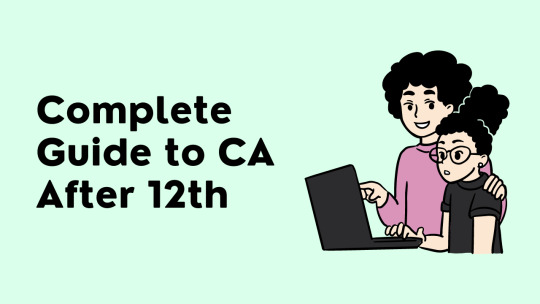
It can be exciting and difficult to start your road toward becoming a Chartered Accountant (CA) as soon as you finish your 12th grade. You will find all the information you need about the CA course in this all-inclusive guide, which includes eligibility requirements, for your CA Exam preparation.
Eligibility Criteria
To pursue a CA course after 12th, you need to meet the following eligibility criteria:
Educational Qualification: You must have completed your 12th grade from a recognized board.
Minimum Marks: There is no minimum percentage required in the 12th grade to register for the CA Foundation Course.
Course Structure
The CA course is structured in three levels:
CA Foundation: This is the entry-level exam.
CA Intermediate: This level requires deeper knowledge and understanding.
CA Final: This is the last stage before you become a certified Chartered Accountant.
CA Foundation
The CA Foundation Course is the first step in the CA journey. It covers four subjects:
Principles and Practice of Accounting
Business Laws and Business Correspondence and Reporting
Business Mathematics, Logical Reasoning, and Statistics
Business Economics and Business and Commercial Knowledge
To excel in these subjects, it's crucial to refer to the right CA Foundation Books.These books provide a solid foundation and help in understanding the basic concepts.
CA Intermediate
After passing the CA Foundation, the next step is the CA Intermediate Course, which comprises two groups with four papers each:
Group I:
Accounting
Corporate and Other Laws
Cost and Management Accounting
Taxation
Group II:
Advanced Accounting
Auditing and Assurance
Enterprise Information Systems & Strategic Management
Financial Management & Economics for Finance
Using the best CA Intermediate Books is essential to grasp the complex topics covered in this level. These books not only provide in-depth knowledge but also include practical problems to enhance your understanding.
CA Final
The CA Final Course is the ultimate stage. It consists of two groups, each containing four papers:
Group I:
Financial Reporting
Strategic Financial Management
Advanced Auditing and Professional Ethics
Corporate and Economic Laws
Group II:
Strategic Cost Management and Performance Evaluation
Elective Paper (Choose one from Risk Management, Financial Services & Capital Markets, International Taxation, Economic Laws, Global Financial Reporting Standards, Multidisciplinary Case Study)
Direct Tax Laws and International Taxation
Indirect Tax Laws
To succeed in the CA Final, it’s critical to use comprehensive CA Final Books and Study Material For CA. These resources provide detailed explanations, practical problems, and case studies.
Essential Study Materials
Study Material For CA
ICAI provides official study materials for all levels. These materials are meticulously designed to cover the entire syllabus comprehensively. They are essential for understanding the core concepts and for exam preparation.
Scanner CA Books
Scanner CA Books are invaluable for exam preparation. They compile previous years’ question papers along with suggested answers. Scanners help you understand the exam pattern, important topics, and the type of questions frequently asked.
Conclusion
Becoming a Chartered Accountant after the 12th grade is a structured yet challenging journey. With the right approach, dedication, and the best study materials like CA Entrance Exam Books, you can navigate through each level successfully. Remember, consistency and hard work are the keys to achieving your goal of becoming a CA. Good luck!
#books for ca exam#scanner for ca intermediate books#ca entrance exam#ca entrance exam books#ca foundation books#ca intermediate books#study material for ca#ca final books
0 notes
Text
Winning Strategies for the last month CA Intermediate Exam
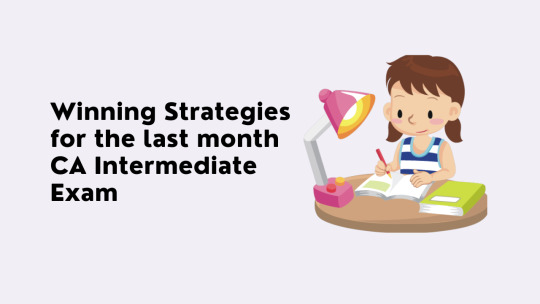
As the CA Intermediate exams draw near, it's time for aspirants to buckle down and focus on effective strategies to maximise their chances of success. The last month leading up to the exams is crucial, and how you utilise this time can significantly impact your performance.
Here are some winning strategies to help you make the most of this crucial period:
Create a Comprehensive Study Plan
Start by mapping out a detailed study plan for the remaining days. Allocate specific time slots for each subject, ensuring you cover all topics adequately. Break down your study sessions into manageable chunks, with short breaks in between to maintain focus and avoid burnout.
Prioritise Revision
In the last month, prioritise revision over learning new concepts. Focus on revisiting key topics from some of the best CA Foundation books and other study materials. Utilise revision techniques like flashcards, mind maps, and summarization to reinforce your understanding and memory retention.
Practice with Mock Tests
Regularly take mock tests to simulate exam conditions and gauge your preparedness. Analyse your performance, identify weak areas, and allocate extra time to strengthen them. Mock tests provided in Scanner CA entrance exam books not only help in assessing your knowledge but also improve time management skills and build confidence.
Seek Clarifications
Don't hesitate to seek clarifications from teachers, mentors, or peers if you encounter any doubts or difficulties during revision. Clearing doubts promptly can prevent misconceptions from affecting your performance in the exams. Utilise CA Intermediate study material, online forums or study groups to discuss concepts and exchange insights with fellow candidates.
Focus on Conceptual Understanding
Instead of rote memorization, aim for a deep understanding of concepts. Focus on the underlying principles and logic behind each topic, which will not only help in answering theoretical questions but also in tackling practical problems more effectively.
Time Management
Practice time management rigorously during your study sessions and mock tests, especially with CA entrance exam books. Allocate appropriate time to each section of the exam and ensure that you complete the paper within the stipulated time. Prioritise questions based on marks and difficulty level to maximise your score efficiently.
Stay Healthy and Energised
Take care of your physical and mental well-being during this intense period of preparation. Maintain a balanced diet, get adequate sleep, and incorporate regular exercise or relaxation techniques to keep stress at bay. A healthy body and mind are essential for optimal performance.
Stay Updated with Amendments
Stay updated with recent amendments and changes in the syllabus of CA Final books to ensure comprehensive preparation. Incorporate the latest updates into your study material to avoid confusion during the exams.
Avoid Last-Minute Cramming
While it's tempting to cram information from CA Intermediate books in the final days, avoid this practice as it can lead to information overload and confusion. Stick to your study plan, focus on revision, and trust in the preparation you have done so far. Engage in activities that relax your mind and maintain a positive attitude towards the exams.
Visualise Success
Visualise yourself succeeding in the exams and achieving your goals. Positive visualisation can boost confidence and motivation, helping you approach the exams with a calm and focused mindset. Believe in your abilities and stay determined to give your best effort.
Conclusion
The last month before CA Intermediate exams is a critical period that requires disciplined preparation and strategic planning. By following these winning strategies, you can optimise your study approach, maximise your preparation, and enhance your chances of success. Stay focused, stay motivated, and remember that hard work and perseverance always pay off in the end. Best of luck!
0 notes
Text
Books For CA Foundation June 2024 Exam
In June 2024, the CA Foundation exam will challenge aspiring Chartered Accountants with a comprehensive assessment covering Accounting, Business Laws, Quantitative Aptitude, and Business Economics. This exam serves as a pivotal milestone in their journey towards professional certification. Candidates must demonstrate proficiency in understanding core concepts, applying knowledge to real-world scenarios, and staying updated with current regulations. Success demands diligent preparation, strategic study techniques, and a thorough grasp of the exam syllabus.
Books for students attempting the CA Foundation Exam June 2024
For students preparing for the CA Foundation exam in June 2024, comprehensive study materials covering all subjects is essential. Opt for CA Foundation books specifically tailored to the CA Foundation syllabus, authored by reputable professionals or institutes. Additionally, solve previous years' question papers and practice mock tests to familiarize yourself with the exam pattern and improve time management skills. Utilize supplementary materials like revision guides and concise notes to reinforce key concepts. Ensure the books are up-to-date with the latest amendments and revisions in relevant laws and regulations. Effective time management and focused study are crucial for success.
Here is the list of best CA Foundation books that students can choose to get the best results in their CA Foundation Exam:
Paper-1: Accounting
Features
Scanner Green Edition CA Foundation Paper 1 Accounting
Solutions as per Schedule III of Companies Act, 2013 and Revised Accounting Standards
Analytical classification of every chapter
Contents establishing correlation between study material and chapter in Scanner
Complete Syllabus
Complete Questions with Solutions
For June 2024 Exam Onwards
Including questions and solutions of June 2023
As per latest updated syllabus of ICAI
Free app for MCQ’s & support
Author: CA Amar Omar, CA Rasika Goenka, CA Nishant Kumar

Paper 2: Business Laws
Features
Scanner Green Edition CA Foundation Paper 2 Business Laws
Solutions as per Schedule III of Companies Act, 2013 and Revised Accounting Standards
Analytical classification of every chapter
Contents establishing correlation between study material and chapter in Scanner
Complete Syllabus
Complete Questions with Solutions
For June 2024 Exam Onwards
Including questions and solutions of June 2023
As per latest updated syllabus of ICAI
Free app for MCQ’s & support
Author: CA Amar Omar, CA Rasika Goenka

Paper 3: Quantitative Aptitude
Features
Scanner Green Edition CA Foundation Paper 2 Business Laws
Solutions as per Schedule III of Companies Act, 2013 and Revised Accounting Standards
Analytical classification of every chapter
Contents establishing correlation between study material and chapter in Scanner
Complete Syllabus
Complete Questions with Solutions
For June 2024 Exam Onwards
Including questions and solutions of June 2024
As per latest updated syllabus of ICAI
Author: CA Amar Omar, CA Rasika Goenka, CA Nishnat Kumar

Paper 4: Business Economics
Features
Scanner Green Edition CA Foundation Paper 2 Business Laws
Solutions as per Schedule III of Companies Act, 2013 and Revised Accounting Standards
Analytical classification of every chapter
Contents establishing correlation between study material and chapter in Scanner
Complete Syllabus
Complete Questions with Solutions
For June 2024 Exam Onwards
Including questions and solutions of June 2024
As per latest updated syllabus of ICAI
Author: CA Amar Omar, CA Rasika Goenka

Conclusion
As students prepare for the CA Foundation exam in June 2024, the importance of choosing the appropriate ca foundation study materials cannot be overstated. Opt for textbooks specifically designed to align with the syllabus. Focus on comprehension rather than mere memorization, and allocate sufficient time to practicing with mock tests and previous exam papers. Embrace a well-rounded study strategy and remain abreast of any regulatory updates. With this approach, candidates can approach the exam confidently and set themselves on the path to success in the rigorous realm of Chartered Accountancy.
0 notes